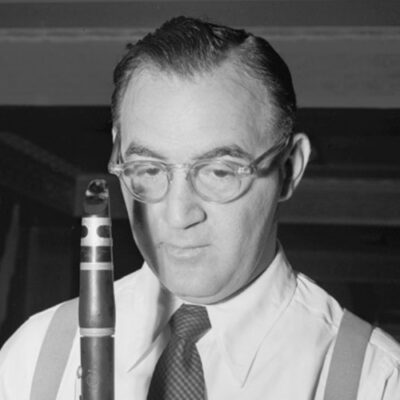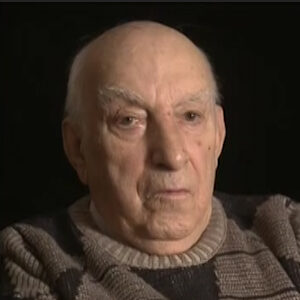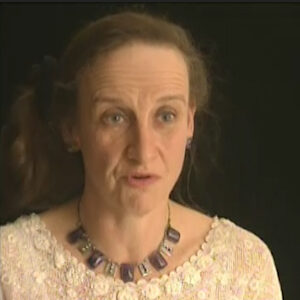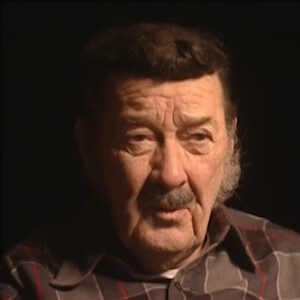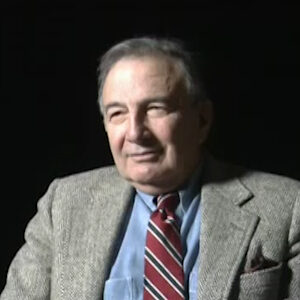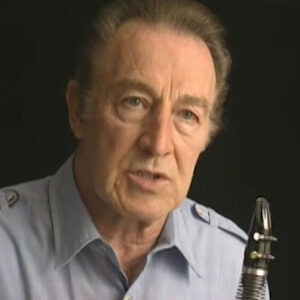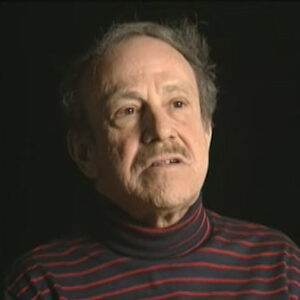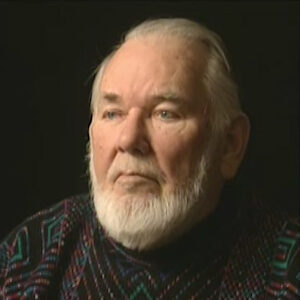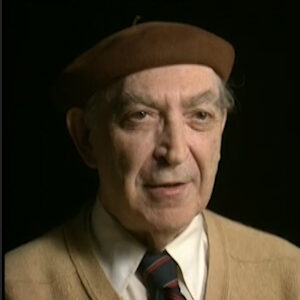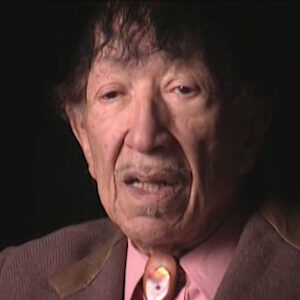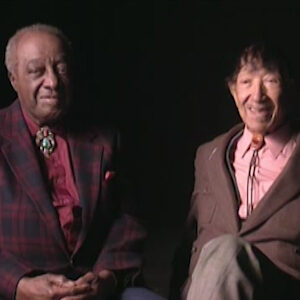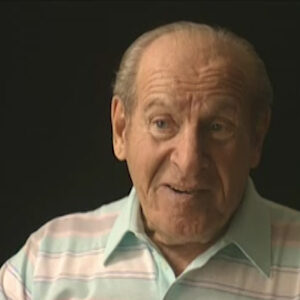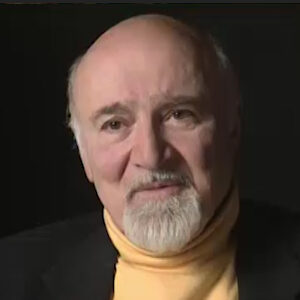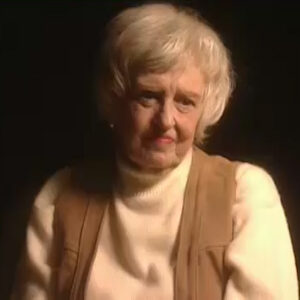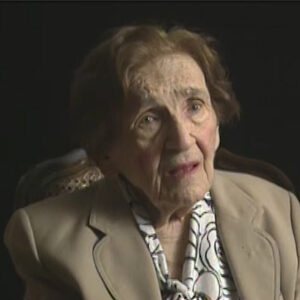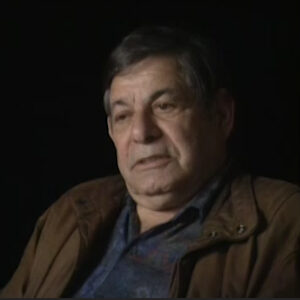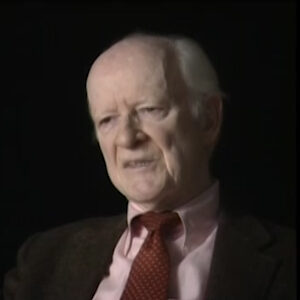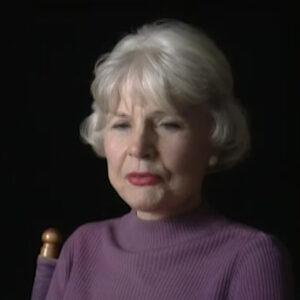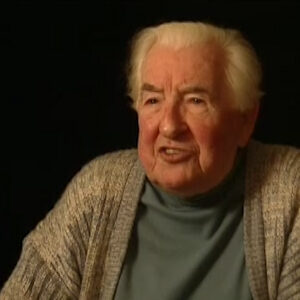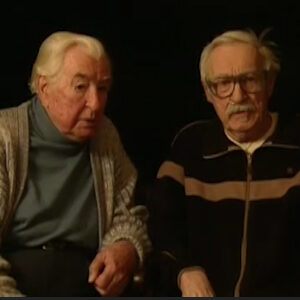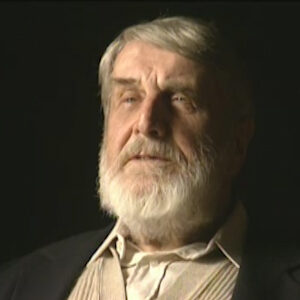Speaker One of the things or you know, when I listened to my tape, I found it a bit la di da.
Speaker The first part of it anymore. And so it was just the way I was I was beginning and it was just a little too. So that’s why I want to keep it low key. Well, I mean, when it got into the musicians that everything was perfect.
Speaker So I tried to make way look my way. So we see your beautiful blue eyes because if you look down there.
Speaker Yes. Don’t, don’t, don’t mumble. When the cameras on, you feel self-conscious and yes, I try, you know, you stopped me.
Speaker So tell me first about hearing the radio program. Let’s dance. What?
Speaker Well, you remember it just at that time, which must have been, I think, 1934, maybe the end of 1933. Benny Goodman had won the contract for that stance. And it was on I think it was Saturday night. So it was broadcast. Coast to coast. And of course, it’s the first time we ever got a chance to actually hear swing music. And it came over the air and it was Benny recognizably so. And it was wonderful band and it was simply marvelous. So it was like a breakthrough audiobook. And and so everybody that tried to listen and and were very excited. And Benny always tease me about the fact, Benny Goodman, that I wrote him his first fan letter.
Speaker I wrote again, you said it yourself. Benny always just from Benny, always tease me. Yeah. He always tease me.
Speaker Benny always tease me because I wrote him what he said was his first fan later. As a matter of it was my first one and only. And but I was so thrilled and I thought he must be encouraged and we must keep this up. And so that’s what I told him. And that was always a joke with Benny. That, in a sense, was later an introduction to. But so that that was something very important. And when I got to go to the United States, the next big moment for me was I went via Detroit to to Chicago, one in Detroit. I went to the Greystone Ballroom because Fletcher Henderson was praying. And I was everybody I think is agreed. That was probably Booth. As far as a dance band is concerned, it was probably the best ever. I mean, it today, naturally times of change, but it was it all. Everybody in the band was stars and was wonderful band. And I had the opportunity to meet Fletcher. And that was interesting because in the end, Fletcher did so much arranging for Benny.
Speaker Can I quit? That’s fantastic. Is that all right? That’s great. Now, the next thing after the last dance is Minneapolis, I guess. Yeah. His band was on the road.
Speaker Yes. And then I can imply that it was not going well, you know. So then I finally got to hear the Goodman Band because they played Minneapolis and. And they’d been bombing all the way out from the East Coast pitifully. So, you know, almost had the guys in tears because simply just everybody just thought it was awful. And I’ve forgotten who. We went out to Minneapolis. And there was the band and Bunny Berrigan in it. And of course, it wasn’t very often that anybody ever heard Bunny in that band. And Bunny was as much inspiration to that man as Benny was because he was absolutely sensational. And so as far as I was concerned, I was very thrilled and I wrote that up.
Speaker And now tell me about what you remember anything from that night coming into the ballroom. And there weren’t many people there or there were a lot of musicians there?
Speaker No, there weren’t even a lot of musicians. And it was just we’ll be there to start. Oh, I’m sorry. Yes, that’s right.
Speaker When I got out to the ballroom, you know, we had thought that, sure, it would be crowded and it wasn’t tall and people were just a very low key. Nobody was crowded around the bandstand.
Speaker And when the band played half the time, people didn’t do an uproar to get them to play some more. It was just very look very dead and. But as I say, that didn’t affect what effect it had on us and how absolutely marvelous Bonnie was. And then and the band themselves and Benny and everybody remembered that night because after that, I don’t think Bonnie even got out to the West Coast yet, actually.
Speaker Did he? Was he at power model? Oh, well, that’s good. So we can cut that out. Well, all right. Let’s switch some of that down. You want to drink of water? You know I’m all right. I’ll show you if I do it. How about jazz?
Speaker Even though when he was on the road. I mean, this goes right along with the families bombing, and Charles was not.
Speaker Yes. Well, I should jump into Chicago. How I got there. Don’t you think so? Because then I’ll say that I was working on actually, my first real experience of things was when I went to Chicago. My sister and I had come out in Toronto and we had a coming out party. And McKinney’s cockpit was was to play it, which would have been just a very big thrill. And as it was, they had some of the men were involved in a car crash and Fathead Thomas died. He was a star. So McKinney said didn’t come off was a great disappointment to me. And so I decided, well, I’d better go to Chicago, where I will hear the kind of music I want to hear, you know? And so I did. And that was it was very fortunate night for me. There was a very active group in Chicago which was centered around Edwin Ashcraft, third squirrel Ashcraft, as everybody called him, half. Well, some of them were sort of amateur musicians and they were all from prominent Chicago families. They were all very nice.
Speaker And so I gravitated to that, you know, and then so together, Squirrel and I founded the Chicago Rhythm. And our whole point was that Poro Benny had been bombing everywhere. And then we knew he was doing well at the Parama. But if he bombed on the way back again, the office would have called him in. And so we thought it was terribly important that he should have a success in Chicago. And how would we do it? And while I was doing so, I was freelancing for the Herald American and I could get the names of all these gals and whatnot out of the society pages. So we got a little perversely that way. And I was also writing for Downbeat in those days, Downbeat. It was just beginning. And Carl Clambers was the editor. And he really was had stood on the corner of Randolph Street and somewhere else, the musicians union, with a sheet of paper, four sides. And he was handing it out. This was downbeat. And when I saw this thing, I. I said, Tom, where’s the jazz? And he he he said, the jazz. You know, people like Jeff, Stacey, George were playing all kinds of good jazz musicians in Chicago or were just starving and weren’t known at all. In fact, people look down on them. And so anyway, I got to write the jazz for Downby. From there on. So that gave me a place to write about it. And so we determined that the best thing to do was put on a concert. It would be newsworthy. There’d be no concert of jazz ever given in the US. I think that was one in England. And so this would be made news. And we started to work on that. Along came Bernie. And Freddie Goodman, Bennie’s trumpet playing brother, I was working with us on two. And so Freddie introduced me to Bernie and of course, I was very pleased. I thought, you know, some wonderful and Bernie would be thrilled. So Benny gave me that Goodman look. And it wasn’t at all impressed. So we went upstairs and I explained.
Speaker Yes. Well, yeah. Isn’t this two words perfect? It’s five, you know, cut in different. Yeah. Yes. All right.
Speaker Start up again and say, I can’t have any of said look, any jazz solos played in your own words. But this idea just usually played in ballrooms like this. What about a concert where people pay tickets, buy tickets and they come and they sit down like for a classical concert just so we get.
Speaker Yeah. So they so the audience knows what a concert. And then Benny says, forget about it. Yes, that’s right. Go upstairs. Yes, exactly.
Speaker Yeah. All right. So when Benny arrived, we had this idea and I said to Benny, the idea is that people will listen to the band instead of dancing to the band. We’ll set it up. And the band presents everything they do. And and it could very well be sensational. It’s never been done before. And it would be very newsworthy. And so. So Benny gave me that blank Goodman look and said. I think it’s crazy. And and so. And he was insistent. So anyway, I said, well, we went up to his room and we started to argue and I you know, I couldn’t believe it. I thought, you know, anybody with any sense would say, oh, good idea. Maybe it’ll help, but not any. And specially when he heard it had to be a benefit because the musicians union, that’s the only way they would OK and benefit, please. And who was gonna pay the guys and so on. You know, Harvey Irving Kaufman, who is married to the hotel, he lent some weight. And finally, Benny agreed. And so at that point, we went ahead with this and all these guys and gals, they’d all these people who used to go off to two squirrels every Monday night for jam sessions, all the different musicians and everybody well, everybody got out on the streets again.
Speaker Again, the way you expressed before was that these were society people here, because this way, instead of like musicians, we’re up as girls. Well, it was no. But it was both. I mean that. Yeah, I’m just throwing there. Yes. Lord decided that they were out on street corners selling tickets for the jazz.
Speaker Yes. Well, that and I had said it and I am repeating myself.
Speaker No, you are. That’s why I want to be sure that you do say now. Oh, people who were. Yes. Society. Yes. 80 pages were going out and selling tickets to the Benny Goodman jazz clubs.
Speaker Yes. Does say that. So these people that we had formed, those the Chicago Rhythm Club, these people that I had on the society pages and so on, they were out on the streets hawking their tickets, you know. And this was quite terrific. And of course, the musicians, too, were very keen because they used to go out to squirrels every Monday night. It was a thing everybody went to squirrels and played. So anyway, they had two faced group of these society people and the musicians were pushing it. And so Benny was still very skeptical. But the the occasion happened. It was December 8th, I think, in 30. Five.
Speaker OK, you know, again, let’s let’s, as we said before, combined, the two of them to do it is a benefit and have a concert. And now the next idea was gonna throw that was how about. Including Teddy Wilson pretending to be Wilson with the band and a concert also. Where are you? Where you want to hear?
Speaker Don’t worry, because because the thing is that I. I had to battle that hard with many again. And it wasn’t until I told Benny. What if I pay his fare? That’s great. And then we explain to Benny that you bring it down on the floor. So I’ll try or just be fine. Don’t worry about. So will we roll rolling where we broke off. Was we said until the concert took place. We know we don’t want to. So we can just start now. So here Benny had agreed to the concert. In other words. So here we are. Benny had agreed to the concept of concert.
Speaker And the idea would be, you see that everybody would be sitting at tables out front and and the band would be playing to listeners.
Speaker And this very concept pleased the band so much. Gene Krupa said that it was the move, most moving moment of his life. He had tears in his eyes. It was unbelievable to these guys who’d been pushed around so much. And here they were playing a concert and people were thrilled. So that was the idea. That’s what was coming off. But at the same time, I’d said to Benny.
Speaker What about getting Teddy Wilson out and because the trail was so had become known, it had made two sided Victor Records and everybody was talking about it. Was Terry, Bernie and Jean. And they’d first been heard that Mildred Bayliss was made made this wonderful record. So this would just seem to be a Marvis seem to be doings.
Speaker So Béarnaise just was adamant. I mean, things hadn’t got to that point up until then. And Benny said, I can’t put a black guy in the white band. I can’t present a black musician in white band, obviously. I mean, I’ve come so far. I’m at the peak and everything is going so well. And I’m I’m going to prejudice the whole thing now.
Speaker So. So then I said to him, well, what we’ll do is at intermission, you present the trio. It’s an added attraction and it’s and they come down on the floor. And there is a tree. And that’s exactly what happened then it was outrageous. It was simply marvelous.
Speaker That’s great. We just walked in. Yeah. We say then the other thing. Any news on who’s going to pay for it? How are you going to get to the.
Speaker Oh, yes. Half hour. Yes. Have you had the. I have somebody is is way out. Yes. Yes.
Speaker So we’ll go. Let’s go back. Actually, let’s let’s take it from his. His answer to you is that I said, you know, what about free. Yeah. Let’s do it again. And don’t use it if you don’t mind. Do you know prejudice when you say, here I am at the top of my head and that just makes it sound like it’s race prejudice.
Speaker So just. Oh yeah I the a pick and that’ll spoil everything. Yeah. No it all starts right there anymore. That’s right too. That’s right.
Speaker Yeah. Let me try that. So I put this to Benny and so he felt that it was too much to be doing.
Speaker He felt he couldn’t do that. He he felt that the put a black man, one black man into a white man. I’ve never been done before. And people would be upset. They wouldn’t know what to think. And Benny felt that it was risky for him. He’d come so far and he was doing so well and he just felt we were asking him to risk everything.
Speaker So we we made the point, you know, of how it could be handled, that the trio would be introduced at intermission and it would come down on the floor and it would be a separate attraction. And so he was weakening a little bit. Just a little bit. And so. So I said, Tom, what if I brought Ted? What if I brought Ted Yoho? You know, what if we brought Teddy out to you and Venis absolutely had stayed right away.
Speaker You said let’s go. That’s right. Very, very sad. What about the money that’s going to get here? So it’s be paid for. Yes. Yes.
Speaker So. So. So at that point, Ben, it was Ben who said, well, what about the money? Bring him up. And so I said, though, we’ll pay for it. It will be paid for. And so he he weakened with that, but not totally. And he said, well, I’ll think it over. Which was. And so I called Ben and I called Teddy and he came. And so there he was. And Irving Kaufman was a help again. And so when he agreed and of course, it it turned out to be absolutely sensational. Time magazine wrote it up, too. And they referred to Bernie as the man of the hour. So that was very nice.
Speaker And I think Bernie was a bit convinced to any good.
Speaker Should go back and cover. Yes. You won’t take it, Rick Warren?
Speaker No. Oh, yes. Keep the hands still. Always finish your sense of humor, like. Yeah. Yeah, I. Well, I really was saying it to oral and I shouldn’t have done it.
Speaker No. All right. Good. Well, let me think just a second. The. I’ll say one of the things I was writing about for now. Yes, one of. OK. Is are we rolling? One of the things that I was writing about when for Downbeat, I tried to write about those various Chicago musicians who were good, and there were a number of them, and particularly those gestated. And Jazz was working at the subway, which was an enormous cellar, underground place, great big old place. And poor jazz was on his own 10, 10 p.m. to about four a.m..
Speaker No, no rhythm, nothing. It was jazz and he was absolutely wonderful. And I used to go down a lot and I wrote about it and John Howard read about this. And of course, John was always looking for people that Benny should hire and so on. So he came out and I took him there and he was completely thrilled. And he went took action right away and told Benny in no time, just was had joined the band even before they came out. So that was very nice. It was a good thing.
Speaker Great. That’s we got that one.
Speaker I did the gesture I gave him I’m sorry. What shall I just say? Shall I just say cut?
Speaker You have standing to say, OK, we did that one.
Speaker Well, let’s say if you want to cut horizontally, cut, because it will be clearer in my mind. But I wanted to know, did you want. Did you want that business about chess. About John. Absolutely. Now I’ll have to say another story about John. Something.
Speaker Well. Well, I just was going to ask you another story about mr. There was a little bit of sense of rivalry here. John felt threatened. Here was this woman in Chicago writing about these musicians, and then he wrote this sort of slur about you.
Speaker Well, who sort of. So there you go. Is somebody going to say that?
Speaker You tell it. I’m telling you. Right. Oh, you told me the other. All right. If you don’t mind. No, no. Because it actually all adds up. Nothing that I want to get and talk about. And what about John? Yeah. Let’s start with you, you were right.
Speaker Well, Winwin. Well, I’ve I’ve I’ve told about that. John was very pleased and he’s got Jannsen everything. There was something else that came up with John, who, of course, was very close to to Benny. And John didn’t like the idea of somebody being out there in Chicago was doing this sort of things that he did and might be horning in on his territory and so on. And so, Joan, I heard from various people. You see, John was scanning me one way or another. And and I thought, well, you don’t just sit down under that. You have to do something about. And so John, who wrote for the New Masters and all these things and wonderfully so, he was a wonderful guy, but so I thought. So I wrote in Downbeat that John apparently was a parlor pink because he was right in his face. But that’s about the most. And though cause John was terribly offended by this and pop down a plane and rushed out and came to see me. And so that was fine. We were able to talk it right out and we became friends. From there on. So it wasn’t any difficulty with Benny.
Speaker Now you use. I don’t know if that’s good enough, Oren.
Speaker That’s. You know, in that circumstance, I just I mean, to me, it’s an interesting phenomenon. In a way, you were very brave. But here you were, a woman entering this world that was sort of a man’s world. It was jazz. It was already sort of. Yes, beyond the pale and risque. You were opening yourself up to this kind of stuff from the guy who’s supposed to be.
Speaker That’s right. That’s right. What? That I mean. I mean, the whole moral phenomenon is interesting. Well, yes.
Speaker I mean, we’re talking about the fact that swing was regarded by some people as a danger.
Speaker Yes. Dirty Birdie. Yeah, I’d rather not know.
Speaker I think as long as it comes out, I don’t quite know how doctors don’t want to be blowing my own horn in any sort of way. Ah. And the thing is, you know, the irony is that I modeled myself on John. Everybody modelled themselves. I would like to say something about how important Joan was. Kind of say, well, I’ll say it. Well, I’ll go ahead. I was very happy the way it came out because Joan probably didn’t realize it. But I had modeled the things that I was doing and saying on Joan. John was a complete leader in the field and the R3. Everybody owed a tremendous amount to him. He had a position behind him that gave him force, and he did. And he was totally sincere and he really was a wonderful model. So it was too bad that he should have objected. I think he came to realize that. And from there on, we used to when I went to New York, we used to have a date once a week and we were friends. So that worked out very well.
Speaker Now, again, going back to the success of the Congress hotel concert. It was such a big hit. And then when he was leaving the Congress to say that he was supposed to stay for a week and end up staying for six months.
Speaker Yes. You accomplished your task. Yes. So that in your. Yes. Just a simple one. Yeah. Yeah, yeah.
Speaker And then you do. All right. Just just do that to me and our rectified. Well, do come.
Speaker Of course. Did you want the or what did you want the Goodman and the Goodman and Duke Ellington thing.
Speaker Oh yes. Yes, absolutely. Do that as why.
Speaker Well as a cause. It can come in later when he asks. All right. One of the things that happened while Bernie was at the Congress, there were several things we gave several concerts we gave of Marvis concert for Fletcher and and and one or two other ones were specially we gave wonderful concert for Duke Ellington and Benny and Duke hadn’t met each other. And so I gave a little party at my place for them to come together and meet. And and it did. It went very well. And so that way they they knew one another. And it came in very usefully later when Benny was going to do the Carnegie Hall concert. And then, of course, Benny had come in too hard and for a month or a week or something, and he ended up staying about five months or so.
Speaker I’m sorry. Say that again. You don’t know where he was hired.
Speaker And so you came to the Congress hotel that the office had booked him in to the Congress hotel for a week. And of course, Kaufman was so thrilled with him and they increased it and held him over and held him over. And he ended up staying about five months. And so when time came for him to move on to the Pennsylvania where he was to have a great success, and of course, we all could see that know that he was going to have a great success. So Benny asked me, would you want to come with one? And and I had to think hard about that, because in the meanwhile, the Mills office who handled the Duke Ellington band had asked me to come and offered man was a recording job, too, which was very interesting to me. And and I found this song was a very I thought and I told him I said very Wolong will only fight. We’ll just fight. And they’re little smaller, nice French. And so I think I’ll say no. And that’s how it was. And I went to New York and joined the Mills office.
Speaker But when you went to New York. Well, you stayed in.
Speaker Oh, yes, of course. Yes, yes. I’ll say. And I went with the Mills office. But what was very nice work. So I stayed with the Goodman family in Long Island. They were in Jackson Heights.
Speaker Let’s do that again, because it was cute. You looked at him. I looked at him because we don’t because you said me, Long Island start to start again, set up for us. So I ended up moving to New York.
Speaker Yeah. Yes. Right. Yes. Yes. Good. Good. Hey. Jackson Heights. Yes.
Speaker So I ended up not dead now, so I ended up going to New York. And when I did, I stayed with the Goodman family. We stayed out at Jackson Heights with the Goodmans, which was great fun. Benny’s mother was a real character. And Irving, whose very Zollo younger brother, who also played trumpet, was younger, used to blow horn all day long and and Isaac and Bonnie, where they lived around the corner. And it was just very nice. It was fun. Great. I would never sit on its hands. You can count on us. Yes. I’m sorry. Look, I’m going to sit on them because I’m just trying to ask you are and shall I talk about Mrs. Good.
Speaker I’m going down to hear Duke Ellington say again about let’s get a closer. So when I went there after we started read from her here, she was a character. And you can tell some better that she spoke.
Speaker Yes, yes, yes, yes, yes. She loved mysteries. Yes. But what he was doing. Yes. Yes. Yes. Yes. Right. Yes. Yes.
Speaker She Benny’s mother was a character and a very lovable person, I thought. And she didn’t really speak English. She spoke Yiddish. But she explained herself whatever way, whatever came into her mouth. And she was quite thrilled with what then he was doing. She didn’t know anything about what he was doing and she didn’t understand the music granting. She knew it was very thrilling and so and then I would be talking to her about what we were doing with Duke and she was very interested, Jeeves, the the black ban, this black duke. And and she said, I would like to hear that ban. And so I took her down backstage and I told Duke, Benny’s mother is coming to see you.
Speaker And Duke was always very gracious anyway. And if especially about anybody’s family. And so Duke said, how very nice. We will be honored. And so on. And I took her down to a backstage. I joke. And everybody was very used. It was very nice. And I think Benny was pleased to.
Speaker Great.
Speaker I don’t know if it is great, the jealousy.
Speaker Now, let’s talk about the Taliban.
Speaker Yeah, yeah, yeah, yeah, for sure. That’s right. And no talk about know getting better. So describe the sad. Oh, that’s right. You want that, don’t you? Well, all right. I try I try doing this. We might have to do it a couple of times, you know, get the chronology right. In 1937. In 1937, I was I was working for Irving Mills and I was the Aydar man for the Ellington Small Bands Records for the War Berardi label, which was a wonderful job, which was very thoroughly. And in in not only that, but I had the chance to promote the Chick Webb Band who was up at this FOIs ballroom, and this was another band that hadn’t come into it. So. And in the end, Ella Fitzgerald, well, Ella Fitzgerald was with him then and they were well on their way because it was so tremendous. But anyway, so I was trying to promote them as well. And so it occurred to me that maybe Benny would like to play a battle of music up there the way the the black bands always for years, for 10 years, they battled one another everywhere. And it was always a tremendous draw. These are always the towns of play verandahs won all battles. But anyway, Chick was a great bass player. He was really the finest drummer of his time. And what was nice, too, was Gene Krupa thought the world of him, too, which was there was no rivalry there. And so I asked Benny and he said, sure, I’d love to. And so the word. So that in Harlem at the Savoy Ballroom, Benny would becoming. Well, the ballroom was an extraordinary place. It was a great big place up on the second story. There were steps leading up to it. There was a double floor because it was the home of Happy Feet. The dancers, that’s where the Lindy Hop started. And the dancers were absolutely terrific. And that’s whole place used to shake. And so it the whole atmosphere in there was electric at all times, ever. It was truly the home of Happy Feet. Everybody was happy in there. The conditions were not too marvelous, but everybody was happy. And and check was king of the Savoy. He he was permanently there. He just went out occasionally if he saw him. And so then when when the word was out that Benny was coming, there were probably riots in the streets.
Speaker Thousands of people, literally thousand people. They had to call out the mounted priest to take control again. So here was on one stand was Chiclet of and on the other side was Gene Krupa. And one stand was Ella Fitzgerald and the others. That was Benny Goodman. And so it was it was wonderful. Bartlett was very, very enjoyable.
Speaker OK. Did anybody win?
Speaker Well, everybody said that. Everybody said that nobody could defeat Chick Webb in his own home. Base. So I don’t know whether your waters. I mean, certainly, Ben, I didn’t didn’t feed, you know. But so now we’re getting ready for Benis the Carrico concert.
Speaker Well, anywhere you want to know how that audience was out front and all those things, don’t you?
Speaker And but then there’s the thing that Betty asked me if I would if I could persuade you to let him have his three biggest stars.
Speaker You know, now, we tried to get a plug in for Duke. OK.
Speaker So following up on that Batalha swing between Benny, Benny then began working on the Carnegie Hall concert and there was a lot of discussion. Rock OK. I thought it was terrible and there was just a great deal of dissension and so on. The very idea of bringing jazz into Carnegie, which Carnegie was sacrosanct, and it was the home of the symphony and symphony music in every way in classical music everywhere. No such thing had ever been proposed before. But anyway, it was being proposed and everybody did finally agree. Benny himself was terribly nervous. He rehearsed for three days beforehand and all the band was nervous. And Benny asked me then would could I persuade Duke Ellington to let him present Ellington’s three big stars, Johnny Hodges, Cootie Williams and Harry Carney. And this was asking you not to ask your other the other big attraction. Can I have your three best guys? And but Duke was always very generous and he never would hold anybody back. He never held any mysteries back. So they got permission. And then he agreed. And Bass, he was down with Lester Young and. And Bach and so on. And so the time came for the concert. And there was a big outcry. And I didn’t go backstage. I went out front. I wanted to sample the atmosphere and see what was happening and was extraordinary because, you know, people came in in their evening gowns and cloaks and everybody was in, you know, right. And high and so on. And that was probably probably 40 percent of the people. And then the other 60 percent were all the people that were determined to jam in and hear Benny. So it was and then everybody was looking at everybody else to see how they were behaving. And it was a very funny atmosphere. Irving Collodion had from Saturday Review was had done the notes for Benny and Irving had prestige, but Olan Downes was there from The New York Times and his being very stuffy. So anyway, the band started and they were all very nervous and it didn’t come off awfully well. The programming was reasonable, but it wasn’t making it. It was no big sweep to it at all. So for almost the first half of the program, it was iffy. And so you just didn’t know what to think. You couldn’t sit back and relax. And so then Benny called Swinging. Sing, sing, sing. So Benny called Sing, Sing, Sing. And that was it. That began at Benny. Really. By then he was thinking, well, I’d just go for it, good or bad. And he played marvelously well and everybody was playing marvelously well behind him.
Speaker And the wonderful thing happened because he was so carried away and just Stacy was right behind him there playing absolutely. Marvelously, which was. Strange because with Teddy Wilson in the band, that hampered dress. And he lost confidence very often. So he just he played wonderfully behind Benny and Benny was so pleased that he just looked at him and said, Go.
Speaker And chess for once.
Speaker Didn’t worry any more at all. And he just did go for himself. He must have played at least two choruses, maybe more, when everybody was only getting half a cause. And he played after REMOXY. And what was wonderful that everybody knew it. Everybody heard it. And there was huge applause. And it turned the corner for the whole thing was a big success.
Speaker Right. Yes. All right. Keep rolling, then.
Speaker It was a great triumph for Bernie. But just to give a sense of the two worlds of jazz, the night wasn’t totally over the guy.
Speaker Oh, you mean about Basey? Yeah. Yeah. Yeah. Yes. Yes. For these guys, then I was never wrote.
Speaker Yes. All right. I always feel so half ashamed of that. You know that I. Well, I pulled Basey into defeat Chick and they did well.
Speaker And I was working with tails. No, I hated those. Was thought they would. We’re going to go play again and win another battle of the bands. Yeah.
Speaker So it seems a shame not to say it in week. Maybe I can put it in in a better way. You go for it because it’s meaningful. So that note that it wasn’t over that night as far as the band was concerned and all the musicians that were there because that same night Basey was at the Savoy to battle Chick, which is something that I had brought about. Purely for the reason that chick was concentrating on elephants share all the time on his set. Wonderful singer, but he wasn’t concentrating on the band. And he’d owe her a Marvis band. And I kept thinking, well, if only we could sting them. Then maybe they would decide that they’d go for it for themselves.
Speaker And so nobody could defeat Basey. He was swinging his band anywhere. I mean, he swung more than Goodman to. And so this was the big battle between Webern and Basey. And so everybody came. Absolutely. Everybody was there, Benny. And everybody came and. Luckily for me interrupt you. Yeah.
Speaker Closing my eyes and everything, you know, just hearing. So the Carnegie Hall concert finished. Yes. And Basey was wooden playing. He left the stand. Benny Wood had his big triumph. They all got in taxi cab.
Speaker Yeah. Make it little clearer. Yeah. Yeah.
Speaker Right. Now, let’s try to get in. We’ll see.
Speaker All right. I’ll be quick. So. So the other. With the Carnegie Hall concert finished and everybody relieved, Basey rushed off the sand with his guys and then headed for the Savoy. And Benny and everybody piled into a taxi to have the same thing. And everybody headed for the Savoy. And it was a big moment. And of course, it was a very touching moment because everybody who knew what was going on could tell what was happening because you couldn’t defeat Basey, you couldn’t swing the basic band. And and so and at the same time, the people, even the audience in the Savoy, they didn’t want Chick to be defeated. So it didn’t it wasn’t clear. Thank goodness. And and in the end, the newspaper report said that it was a draw and so on. So it was. All right.
Speaker OK, change tapes. OK.
Speaker While Benny was at the Congress, it was it exceeded all our expectations. The band was absolutely marvelous. They were all thrilled.
Speaker And Benny was had finally got what he wanted to be free to play what he wanted with a wonderful band. And he was thrilled. And it showed. And of course, and Helen was his singer, Helen Ward, and she sang wonderfully well. And that that added to everything. Everybody was very pleased about that. But the thing about Benny, it is began, I think, at that time when there was started a little bit of talk about the ray. And and I feel that people misunderstood the ray, specially in the beginning.
Speaker Benny was always obsessed about music. Even when he was playing. He’d be thinking about something else, about his music, and he would get that blank look on his face even when he was praying and his eyes would rest on somebody or other. And and the I they didn’t say anything. They were just black. And this made the guys very uncomfortable. They didn’t know what it said, what it meant. But, I mean, that was supported. It was just that he was absent minded. And then it came to another point, which then he really couldn’t. He was nice in the sense of being modest. He really couldn’t realize that he had exceptional talent. He just thought that the way he felt and was about music, that everybody must be the same way. Nothing unusual. You you you cope with music. It possessed you and you and and and that was it.
Speaker And you. So anybody in the band that made a mistake. He didn’t mean it wasn’t meaning to be mean. He looked at them uncomprehendingly.
Speaker And with such a funny look. That, of course, they did feel very uncomfortable. What is he thinking? He can’t even comprehend that I would make a mistake like that. And so that’s how it began.
Speaker And I, I, I do know that later on, as things zero dated Benny and so on and so on, he he did the ray after that. But that is how it began. He didn’t he didn’t deliberately mean to be to be mean. It just was what happened with Benny.
Speaker Anything else you can say about Helen again, like, hey, do you want to set her up with sort of a character who remember any stories of her Chicago or any talking about her? Were you aware that there was sort of a romance between men?
Speaker Oh, all I want to say is, though, that I suspected it because I wasn’t aware and there wasn’t talk, but I just could feel that that’s fine.
Speaker So say that in your own words. Yes. I won’t be there to set it up.
Speaker The thing about to Helen in the band making it a nice thing was that Helen and Benny related very well to one another and nobody ever said anything. But to my own feeling, I felt. Well, there’s more to it than that because who wouldn’t care for Benny as. That’s fine.
Speaker Is that we gonna do it again? Just put the sofa across the chair.
Speaker Yeah. All right.
Speaker We. Forward. The lights. That’s.
Speaker One of the nice things about when Ben was a chocolate.
Speaker Oh, sorry, you had to get ready.
Speaker One of the nice things when Barney was in Chicago was having Helen Ward as a singer. First of all, you know, there were not jazz singers. And Helen Maude was a very good singer. And it was really a thrill to hear a girl that could swing and could phrase properly. And of course, it was. Please. Very, very much. And that’s why it thrilled Helen to be with the band. And I think there might have been a little more to it than that, because I think it would have been very strange of Helen didn’t feel romantic about Bernie. He was an attractive guy. And. And I think it was reciprocated. So that was quite a nice thing.
Speaker Thing wasn’t that bad. That’s good. So we got in again.
Speaker And was it good enough? You still can’t contraries? No, that was just fine. That’s the way I like Ben.
Speaker It doesn’t matter. I think it just. Well, it is obvious.
Speaker For now, it’s good enough for we most put it in there. Here you were fighting it out with him. Get your way. Yeah. Think about him. Well, we may end the film. I wish it a personal take so people are ready. So. All right. You’re on the thing.
Speaker When I had the opportunity at last to actually meet Bernie personally, I liked him right away. You know, you had that there was the irony tool when that went to him. You just. Well, I like to very much. And of course, when I found I had to fight him to the death, that was a bit of a shock. But I still liked him.
Speaker All right. Let’s talk about Fletcher. Yes.
Speaker One of the things that excited you when you heard the Let’s Dance. Was it here finally?
Speaker Yes, yes. It was pleased me so much when the let’s dance programs were on and Benny was using Prichard’s arrangements, which were wonderful. And and I think John Hammond had to take great credit for selling Benny. The idea that they were wonderful words. They were. And I think Benny never in the end, he always liked driv. Richard Zaranj was better than anybody’s and they suited the band better than anybody else. But it pleased me because Fred Jr. and I had become friends from the Detroit days, the Greystone days. And he used to regularly call me maybe every four or five weeks from wherever he was and call me and tell me what he’s doing and find out everything. And so he was such a different person. He was a very gentle. He was a gentleman, but he was a gentle man, too. And such a nice man and a wonderful movie and very modest. And that’s so unusual, somebody like that. And he was very happy with Benny. People thought, you know, that maybe Benny was using Fletcher. Fletcher was thrilled to have his arranger played as they should be played by Ben, his band. No headaches. And and to be really appreciated and to be able to keep working. No worries. That was Ben. That was Fred. Was really happy time.
Speaker You told me anything about Fletcher. We talked about the music, his musical ideas, and he said the sound has to come from the gutter. Was I.
Speaker Did you tell him that? Yes, I did tell you that. But Fletcher didn’t say that so much. Duke did do. So I think we’ll leave that. Yes.
Speaker Well, then we are done. I hope then we had a year before I could do a any one less than anything else about just about justice, character or justice of being a shag.
Speaker I guess we probably I think we have and other people of the, you know, wonderful blackjack player that you were involved.
Speaker Oh, that’s the only other thing that I didn’t say about Benny Andy back was go for it. Yeah. All right. Good.
Speaker One second. I’m sorry, Mike. Mike is going to go out there to. We don’t want that.
Speaker All right. I want to say, well, I don’t remember do about the ray. There was never really a question of the ray where black musicians were concerned because black musicians inspired and challenged Benny. He always got on wonderfully with the man.
Speaker Thing about him really was he didn’t have any prejudice. Music was his. Guide stick. You know, he.
Speaker And so if musician was wonderful, he was wonderful, whatever color he was, and he was going to be a challenge and thrill. Benny was thrilled when he played with the good musicians. So, I mean, like Cudi and Chani and Larnell to Teddy, not so much because they didn’t Teddy was very reserved jazz really person then. And Benny didn’t get to a different with Ben. Ted.
Speaker It had wanted to tell you didn’t want him to. But it was really wonderful because always wear. It didn’t occur to you. They didn’t pass Ben’s mind or they’re black. You don’t think that he just said they’re they’re great.
Speaker You you started talking about Cudi and and Cudi and Michael and Charlie, and then you didn’t you said, well, Teddy was not Teddy. You didn’t say what they were.
Speaker What was it about all along with them that they were. Oh, yeah. I’d say to say their names again.
Speaker As far as Teddy was concerned, Larnell Kudi particularly and Charlie Christian. Charlie Christian, that paid Marvis guitar. Cody was a tremendous trumpet player. And of course, Ham was a tremendous vibe’s. And Terry, at the piano, they all challenged Benny when when Benny came on with them, he was in fact, they surpassed him.
Speaker Some of them. And he. And that was OK. That was good. He fought back. But, I mean, they had as much challenge as he had. And that’s what inspired Benny. That’s always what Benny needed. It was wonderful. And so as far as any race thing was concerned, there wasn’t. It never crossed his mind at all. They just were top musicians as far as he was concerned.
Speaker That didn’t last. I promise, the last thing is when you look back and think about your life and music and about all the great musicians you’ve known. I mean. And Benny Goodman. Weird. Where? What’s place? Does he hold in your heart in your sort of thoughts about feelings about music?
Speaker Bernie Banton lost to me because he rescued music and he stood for. Something new altogether, something happening, something that should happen. And Betty is responsible for having made that happen. And also, he was a marvelous kind clarinet player, really inspired you couldn’t help. But if you cared for me, as you couldn’t help but love Benny, even all the people who were crossed with him had to love what he could do. And so Benny meant a lot to me. And several people meant a lot to me that way. Basey really was the king of swing, and that meant a lot. And Fletcher and his range was for whatever check, was a wonderful person. So I was lucky enough to know a lot of marvelous musicians, but I certainly would feel that Benny was as important to what happened as any of them.
Speaker That’s lovely. Spraining what you mean when you say he saved the music. How did he say?
Speaker Well, the music was just pop music. I mean, it was all Ben Burnison, Wayne Kings until Benny came along and would have if there hadn’t been a talent like that, it wouldn’t remain that way. It was pop music, dance music, you know. Well, good jazz’s dance music, of course.
Speaker But in those days, you know, people were fox trotting and whatnot. So, I mean, that’s how he saved that. He he. He.
Speaker No, I’ll have to stop. I can’t get the word he. Think about it. Yeah.
Speaker Did he shake it up, did he?
Speaker No, he. He swung. No. He understood in a sense, you know, he went where he found the real sources.
Speaker Yes.
Speaker Even he hears he the jazz had really always existed. But is it always being black? And it took somebody of the stature of Benny who felt it and could play it. To give it respectability so that it could live.
Speaker Thank you. All right. All right.
Speaker And this is room tone.

